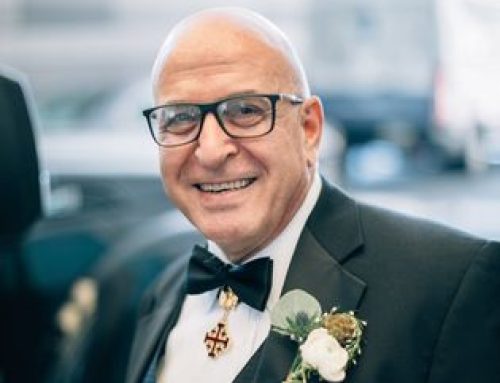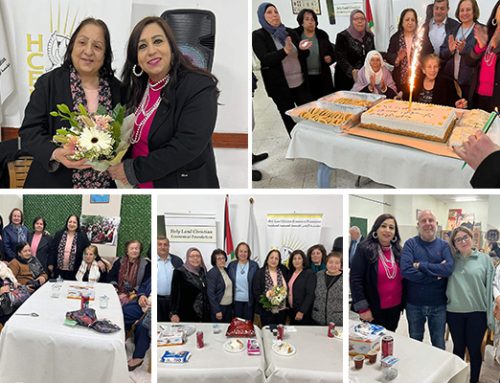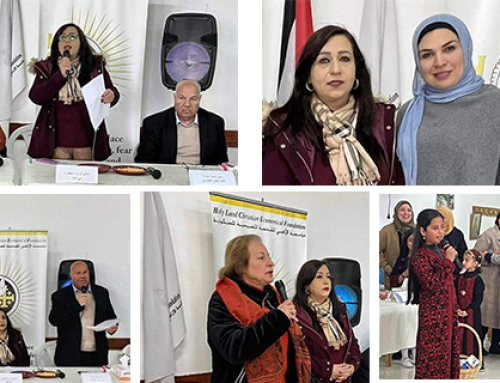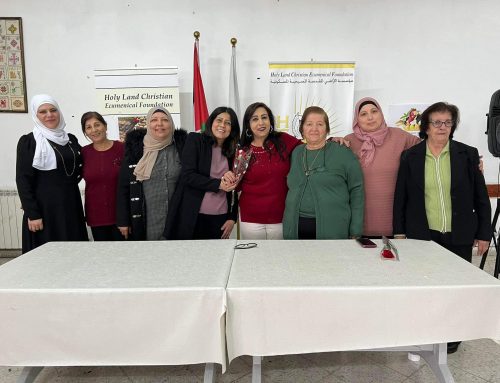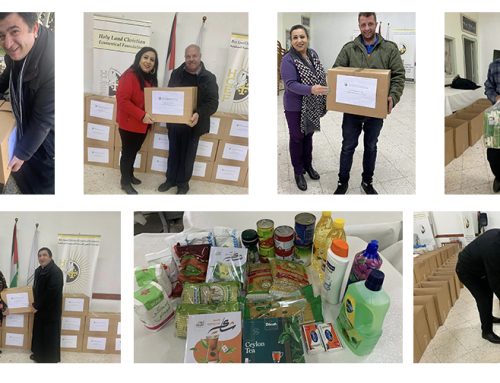Alana Foster
From the 9th through the 17th of May, HCEF was given the pleasure of welcoming a delegation led by Father Rob Waller, Pastor from St. Andrew’s Parish in Ohio, to Bethlehem. The HCEF organized Living Stones Pilgrimage consisted of a journey through the Holy Land, visiting such places as the Mount Nebo Memorial of Moses in Jordan, the Nativity Church in Bethlehem, the Sea of Galilee, the Mount of Olives in Jerusalem, and many other places. The participants of the pilgrimage were not only given the opportunity to visit holy sites in the area, but also to meet and connect with Palestinian Christians – the ‘living stones’ of the Holy Land.
 During their visit to Bethlehem, the delegation visited with their friends and partner parish at the Annunciation Church in Beit Jala. What was especially meaningful about these visits with their partner parish was the chance to reconnect with some of the Palestinian children who St. Andrew’s Parish had hosted in 2003, as part of the HCEF Children’s Peace Project. As part of this project, Christian Palestinian children were hosted by families from St. Andrew’s Parish in the United States for one month. The delegation’s visit to their partner church and the children they had once hosted, now growing into young adults, marked the ongoing partnership between the two parishes, but perhaps more importantly, the ongoing personal relationships and social connections between the two communities.
During their visit to Bethlehem, the delegation visited with their friends and partner parish at the Annunciation Church in Beit Jala. What was especially meaningful about these visits with their partner parish was the chance to reconnect with some of the Palestinian children who St. Andrew’s Parish had hosted in 2003, as part of the HCEF Children’s Peace Project. As part of this project, Christian Palestinian children were hosted by families from St. Andrew’s Parish in the United States for one month. The delegation’s visit to their partner church and the children they had once hosted, now growing into young adults, marked the ongoing partnership between the two parishes, but perhaps more importantly, the ongoing personal relationships and social connections between the two communities.
While in Bethlehem, the St. Andrew’s Parish Living Stones Pilgrims visited with students from Bethlehem University, as well as the Franciscan Sisters at Aida Refugee Camp, to see their work and hear their stories. The delegation paid a visit to the Latin Patriarchate School in Beit Jala to meet with young Palestinian Christians and to see, first-hand, some of the outcomes of HCEF’s Child Sponsorship Program. The Pilgrims also paid a visit to the HCEF office where they learned more about HCEF’s ongoing programs in the Christian Palestinian community. Collectively these visits enabled the pilgrims to see the faces and hear the stories of life and work in the Christian Palestinian community in Bethlehem, and thereby to strengthen their relationships with the Holy Land’s ‘living stones’.
 The St. Andrew’s pilgrims embarked on a two week visit (May 5th to May 18th) to the Holy Land in which they built solidarity with HCEF, their partner parish, as well as the Palestinian Christian community in general. The St. Andrew’s Living Stones Pilgrimage included a boat trip on the Sea of Galilee; the singing of Silent Night at the birth place of Jesus; the renewal of wedding vows of married couples attending the pilgrimage at the church where water was turned into wine; prayer along the Via Dolorosa in Jerusalem with the carrying of the cross, ending at the Church of the Holy Sepulchre. Their journey ended with a visit with the Latin Patriarch of Jerusalem.
The St. Andrew’s pilgrims embarked on a two week visit (May 5th to May 18th) to the Holy Land in which they built solidarity with HCEF, their partner parish, as well as the Palestinian Christian community in general. The St. Andrew’s Living Stones Pilgrimage included a boat trip on the Sea of Galilee; the singing of Silent Night at the birth place of Jesus; the renewal of wedding vows of married couples attending the pilgrimage at the church where water was turned into wine; prayer along the Via Dolorosa in Jerusalem with the carrying of the cross, ending at the Church of the Holy Sepulchre. Their journey ended with a visit with the Latin Patriarch of Jerusalem.
 This trip represented another success story for the Holy Land Living Stones Pilgrimage program, coordinated by HCEF, which seeks to give Christians of the West first-hand experiences of the beauty of the land and people of the Holy Land, as well as to build solidarity between Christian communities in the West and the Christian community in the Holy Land. Pilgrims are given the opportunity to connect with the local Christian community through daily fellowship, the breaking of bread, and joint celebrations. A recent HCEF press release sums it up best: “It is our prayer that every pilgrim will return home with a renewed spirit, and the faces and stories of Jordanian and Palestinian Christians, the ‘Living Stones’, deeply embedded in their hearts, and with a compelling desire to get more involved in the pursuit to ‘replace despair with hope, fear with human security and humiliation with human dignity.'”
This trip represented another success story for the Holy Land Living Stones Pilgrimage program, coordinated by HCEF, which seeks to give Christians of the West first-hand experiences of the beauty of the land and people of the Holy Land, as well as to build solidarity between Christian communities in the West and the Christian community in the Holy Land. Pilgrims are given the opportunity to connect with the local Christian community through daily fellowship, the breaking of bread, and joint celebrations. A recent HCEF press release sums it up best: “It is our prayer that every pilgrim will return home with a renewed spirit, and the faces and stories of Jordanian and Palestinian Christians, the ‘Living Stones’, deeply embedded in their hearts, and with a compelling desire to get more involved in the pursuit to ‘replace despair with hope, fear with human security and humiliation with human dignity.'”
Alana Foster is a student researcher from New Zealand and visiting volunteer who stayed at HCEF’s Guesthouse in Bethlehem. She is currently working on her Master’s Degree at the Victoria University of Wellington, and is conducting research for her thesis in the West Bank on issues of gender in peace building approaches.




